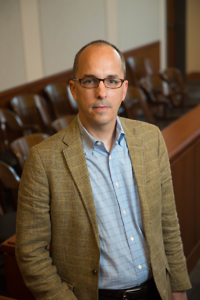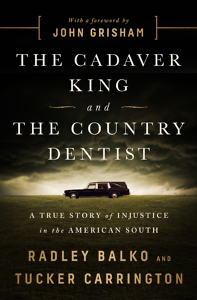What Truths We Can Stomach
The Cadaver King and The Country Dentist tells the story of two flawed trial experts
Near the end of The Cadaver King and The Country Dentist, Radley Balko and Tucker Carrington invoke a haunting line from Flannery O’Connor: “The truth does not change according to our ability to stomach it emotionally.” This book’s central figures are indeed difficult to stomach: two “experts” who for nearly twenty years gave unscrupulous testimony that sent innocent people to prison. Balko and Carrington delve into this tangled history, including the systemic cultural factors that enabled them, and advocate passionately for a review of all convictions in Mississippi and Louisiana that remain unexamined.

The Cadaver King begins with the stories of two chilling crimes—the sexual assault and murder of two young girls committed by the same man during the early 1990s. In both cases, flawed forensic testimony led to wrongful convictions. DNA testing exonerated Levon Brooks and Kennedy Brewer in 2008, but by then the two men had paid a staggering price for the system’s shortcomings. These cases loom over the whole book, keeping the consequences of such testimony close and vivid.
Medical examiner Steven Haynes, known for his extraordinarily high-volume autopsy pace, testified in criminal and civil cases all over Mississippi and Louisiana. Michael West was known as “a Hattiesburg clinical dentist, bite mark expert, and forensic jack-of-all-trades.” Both men had a knack for aligning with the theories (or even just the hunches) of law-enforcement officers and prosecutors.
Though Hayne and West’s “brazen” careers eventually unraveled, the book is careful to focus on the roles they played in a large, complex system. Balko and Carrington argue that Mississippi’s history of death investigations, shaped by “sheriffs, police chiefs, and prosecutors,” had evolved to “facilitate law enforcement’s desires as reflected by the prevailing status quo. Sometimes that is justice. But at other times it’s been something quite different.”
Often that “something quite different” was a cover-up for racially motivated murder. Coroners’ offices routinely denied justice for the victims of lynching, even when the crimes were public spectacles. During the civil-rights era, coroners frequently mislabeled the murders of African-Americans as suicides or accidents.

The authors also trace the convoluted history of coroner as an elected position, especially in its vulnerability to political pressure and its lack of medical requirements. As medicine became more precise, reformers called for medical examiners to replace coroners in the legal system. The resulting antagonism between law and science resonates throughout the events of this book, creating a sobering picture of how criminal justice has used pseudo-scientific testimony to obtain convictions. All these factors, the authors argue, made it possible for Hayne and West to set up shop despite their own questionable credentials and to testify in criminal courtrooms without facing significant challenges to their findings.
Hayne, who became the system’s superstar autopsy performer, was “a doctor who could simultaneously please the coroners by making them feel needed and legitimate, law enforcement by helping them get convictions, and state legislators by taking the entire problem—and the problem of funding it—off their plates.”
Given the courts’ inconsistent standards for scientific testimony, the system was also eager to find an “enterprising showman” like Michael West, an expert who “might go beyond fudging test results or tweaking lab results. He might invent new disciplines from whole cloth … and claim expertise and powers of observation that only he possesses.” West’s bluster and Hayne’s political talents kept their careers going even after DNA exonerations began to crack the façade of these “expert” witnesses.
 In his thoughtful foreword to the book, John Grisham writes: “This is a maddening story of a broken system.” Indeed, the damning details add up at a relentless pace. But The Cadaver King presents a necessary picture of exactly how resistant to conscientious review our criminal justice system can be at every step along the way—from under-experienced (though well-intentioned) local policing to politicized prosecutorial decisions to lax standards for testimony to the endless catch-22s of the appeals system.
In his thoughtful foreword to the book, John Grisham writes: “This is a maddening story of a broken system.” Indeed, the damning details add up at a relentless pace. But The Cadaver King presents a necessary picture of exactly how resistant to conscientious review our criminal justice system can be at every step along the way—from under-experienced (though well-intentioned) local policing to politicized prosecutorial decisions to lax standards for testimony to the endless catch-22s of the appeals system.
Among the reasons for Mississippi’s unwillingness to scrutinize two decades of potentially wrongful convictions is the unavoidable reality that the courts are now led by judges who rose to prominence during this era themselves. To reopen these cases would be to risk unraveling their own legacies. Herein lies the heartrending current that pulses through The Cadaver King and the Country Dentist: how many among us would have the courage to insist that our communities confront the darkest parts of our own histories?

Emily Choate holds an M.F.A. from Sarah Lawrence College. Her fiction has been published in Shenandoah, The Florida Review, Tupelo Quarterly, and The Double Dealer, and her nonfiction has appeared in Yemassee, Late Night Library, and elsewhere. She lives in Nashville, where she’s working on a novel.


